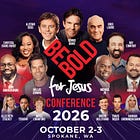The Great Evangelical Schism: Part 3, Doctrine
This post is part of a continuing essay series. The first installment can be read here:
I have been to more than one Evangelical church where the pastor, lacking any formal training, had no understanding of the very real history of Israel in the Old Testament passage he was preaching from—let alone the Christology within. Consequently, I had to bite my tongue while the entire congregation nodded along, as he turned everything into an allusion to 21st-century American culture-warring. I have seen, time and time again, the doctrine and knowledge of God and the duties of the disciple take a back seat in Evangelical preaching and teaching, in favor of some sort of “life application,” where the infinite Creator is reduced to fulfilling the role of an emotional support animal for whatever the target audience is currently doing that is unquestionably correct. Is there any doubt why I have even met people who describe themselves as Evangelical, and yet cannot give a basic explanation of the gospel?
The theological state of Evangelicalism is in shambles. Look at the numbers coming out of this year’s State of Theology survey:
Half of Evangelicals think God accepts the worship of other religions.
One in seven think the Holy Spirit can tell them to disobey Scripture.
Over half think there are sins God overlooks, to some degree.
There is next to nothing that Evangelical leadership is doing to fix this issue. The one person in the Southern Baptist Convention actively trying to stem the tide, theologian Malcolm Yarnell, who is attempting to make the Nicene Creed official doctrine of the convention, is treated antagonistically by politics-obsessed power-brokers for his efforts. As discussed in the last installment, Evangelical gatekeepers are too busy doubling down on politics, which is reflected in the survey by Evangelicals’ near unanimity on points of the culture war. This is the key fault line of the schism, an irreconcilable abandonment of the defense of foundational truths that have been the only points of agreement for Christians of all stripes through every other schism over the last millennia. Even core distinctives of the Protestant tradition are being abandoned in favor of the American folk religion of politics.
The doctrine and theology of Jehovah’s Witnesses and Latter Day Saints, most notably their heretical views of the Trinity, causes orthodox Christians to rightly consider their beliefs a wholly different religion. We now have undeniable proof that whole swaths of self-described Evangelicals hold beliefs that are more inline with those other religions than with the one they claim. This should be the greatest single crisis in all of Christendom, but, again, Evangelicalism’s leaders are too busy jockeying for notoriety as the vanguards of the losing side of a political war. It’s a losing side, because these leaders, for generations, have created a cultural environment where it is considered uncouth, even against the spirit of “unity,” to enforce the fundamentals of the religion. What “Christianity” are they trying to center the politics of the nation around? In their culture war obsession, they will go to the ends of the earth to anathematize a woman teaching orthodoxy, in the name of “Scriptural faithfulness,” while ignoring the open heresies, and even the objectively disqualifying behavior, of male pastors they find politically useful.
This is unsustainable; as this trend continues unabated, there will come a breaking point where the remnant of faithful Protestant Christians in America will overwhelmingly recognize that they do not share not only the same political immediacies with Evangelicals, but that they do not share the same religion. As our nation itself is polarizing over politics, these divides will likely be as large as that which split the European church five centuries ago. Yet, as there are plenty of pastors and theologians who have orthodox theology, but are unwilling to relinquish their political prioritization, the lines of this impending schism are not as clear as the cause. The next installment will be one of speculation on this subject.





Very good Blake. It's so, so sad that people aren't being taught basic doctrine in their churches and that that takes a back seat to politics for online influencers.
Love this!